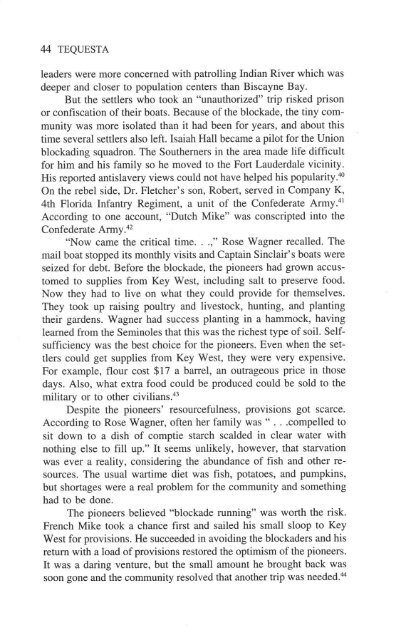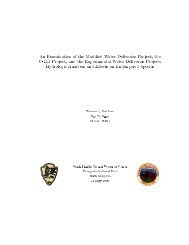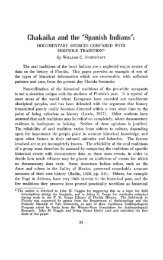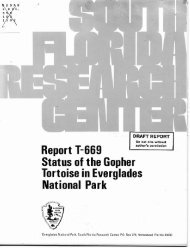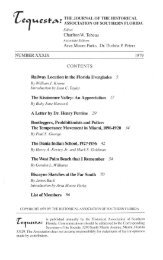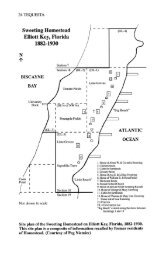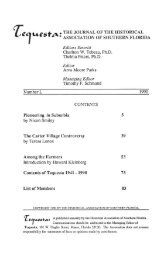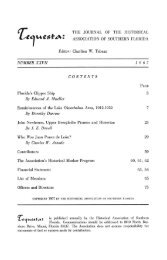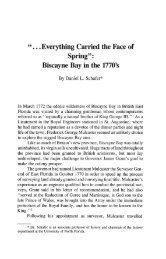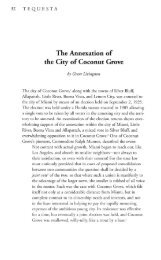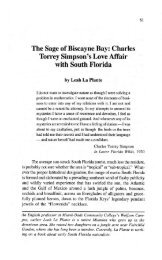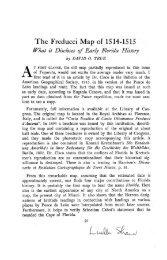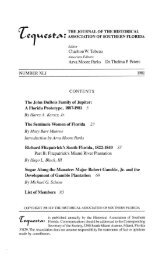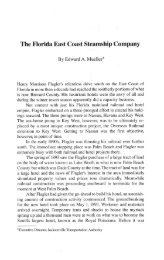Miami During the Civil War - FIU Digital Collections
Miami During the Civil War - FIU Digital Collections
Miami During the Civil War - FIU Digital Collections
Create successful ePaper yourself
Turn your PDF publications into a flip-book with our unique Google optimized e-Paper software.
44 TEQUESTA<br />
leaders were more concerned with patrolling Indian River which was<br />
deeper and closer to population centers than Biscayne Bay.<br />
But <strong>the</strong> settlers who took an "unauthorized" trip risked prison<br />
or confiscation of <strong>the</strong>ir boats. Because of <strong>the</strong> blockade, <strong>the</strong> tiny community<br />
was more isolated than it had been for years, and about this<br />
time several settlers also left. Isaiah Hall became a pilot for <strong>the</strong> Union<br />
blockading squadron. The Sou<strong>the</strong>rners in <strong>the</strong> area made life difficult<br />
for him and his family so he moved to <strong>the</strong> Fort Lauderdale vicinity.<br />
His reported antislavery views could not have helped his popularity."<br />
On <strong>the</strong> rebel side, Dr. Fletcher's son, Robert, served in Company K,<br />
4th Florida Infantry Regiment, a unit of <strong>the</strong> Confederate Army. 41<br />
According to one account, "Dutch Mike" was conscripted into <strong>the</strong><br />
Confederate Army. 42<br />
"Now came <strong>the</strong> critical time. . .," Rose Wagner recalled. The<br />
mail boat stopped its monthly visits and Captain Sinclair's boats were<br />
seized for debt. Before <strong>the</strong> blockade, <strong>the</strong> pioneers had grown accustomed<br />
to supplies from Key West, including salt to preserve food.<br />
Now <strong>the</strong>y had to live on what <strong>the</strong>y could provide for <strong>the</strong>mselves.<br />
They took up raising poultry and livestock, hunting, and planting<br />
<strong>the</strong>ir gardens. Wagner had success planting in a hammock, having<br />
learned from <strong>the</strong> Seminoles that this was <strong>the</strong> richest type of soil. Selfsufficiency<br />
was <strong>the</strong> best choice for <strong>the</strong> pioneers. Even when <strong>the</strong> settlers<br />
could get supplies from Key West, <strong>the</strong>y were very expensive.<br />
For example, flour cost $17 a barrel, an outrageous price in those<br />
days. Also, what extra food could be produced could be sold to <strong>the</strong><br />
military or to o<strong>the</strong>r civilians. 43<br />
Despite <strong>the</strong> pioneers' resourcefulness, provisions got scarce.<br />
According to Rose Wagner, often her family was " . . .compelled to<br />
sit down to a dish of comptie starch scalded in clear water with<br />
nothing else to fill up." It seems unlikely, however, that starvation<br />
was ever a reality, considering <strong>the</strong> abundance of fish and o<strong>the</strong>r resources.<br />
The usual wartime diet was fish, potatoes, and pumpkins,<br />
but shortages were a real problem for <strong>the</strong> community and something<br />
had to be done.<br />
The pioneers believed "blockade running" was worth <strong>the</strong> risk.<br />
French Mike took a chance first and sailed his small sloop to Key<br />
West for provisions. He succeeded in avoiding <strong>the</strong> blockaders and his<br />
return with a load of provisions restored <strong>the</strong> optimism of <strong>the</strong> pioneers.<br />
It was a daring venture, but <strong>the</strong> small amount he brought back was<br />
soon gone and <strong>the</strong> community resolved that ano<strong>the</strong>r trip was needed. 44


